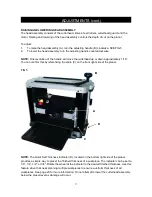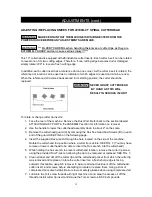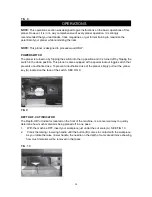
23
OPERATIONS (cont.)
AVOIDING SNIPE
Snipe, gouging or depression of the board at the ends, can occur when the board is not properly
supported. For workpieces longer than 4 ft, greater care must be taken to reduce the problem
because the additional length of the workpiece translates into more unsupported weight pulling
down on the end of the board. This unsupported weight will work against keeping the stock flat.
Make sure to use supports or stands whenever long pieces are being planed to avoid this problem.
Since snipe occurs at the end of the boards, it is good practice to start with a workpiece that is
slightly longer than what you need so that you can simply cut off the ends if necessary.
Also see TROUBLESHOOTING for further information.
MAINTENANCE
WARNING!
MAKE CERTAIN THAT THE MACHINE IS DISCONNECTED FROM THE
POWER SOURCE BEFORE PERFORMING ANY MAINTENANCE PROCEDURES
Your planer should provide you with a long time of service provided you take the time to perform
the following maintenance operations.
CLEANING
Sawdust buildup and other debris can cause the tool to plane incorrectly. Periodic cleaning and
waxing is needed for accurate, precision planing. Any moving parts should be cleaned regularly
with a penetrating oil and lubricated with a light coating of medium weight machine oil
CAUTION!
With the machine unplugged, blow off motor with low pressure air to remove dust
or dirt. Air pressure above 50 P.S.I. should not be used as high-pressured air may damage
insulation. The operator should always wear a respirator and eye protection when using
compressed air. Do not allow chips and dust to accumulate under the machine. Keep area clean
and in safe order.
Having clean feed rollers is essential for optimal results. Check feed rollers after each use for
buildup of pitch, gum, or resin, and be sure to clean off with a non-flammable tar and pitch
remover that is not harmful to rubberized surfaces.
Periodically clean, wax, and buff the tables. This will aid in the prevention of improper feeding of
the workpiece.
HARDWARE TIGHTNESS
Periodically check all clamps, nuts, bolts, and screws, for tightness and condition. Stop the
machine and recheck the cutterhead screw and knives, or tips, for tightness after about 50 hours
of operation. Recheck periodically.











































